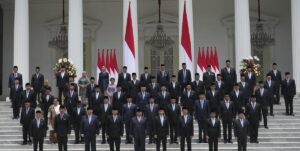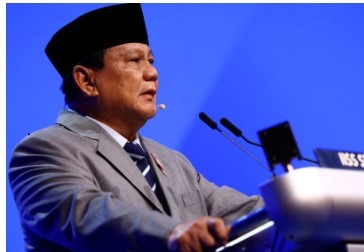
Dr Mehmood Ul Hassan Khan
Foreign policy is always a complex and complicated subject to predict however, it seems that the new president of Indonesia may take new steps/initiatives to further strengthen Indonesian role in the region and beyond in terms of rigorous economic diplomacy, increasing trans-regional connectivity, paradigm shift from neutrality to constructive neutrality, peace, stability and harmony. Thus innovative, integrated, and coordinated efforts are needed to start a new leap in the foreign policy of Indonesia in the days to come.
By appointing his close confidant Sugiono, a former first lieutenant in the Indonesian army, as his foreign minister, the message is loud and clear that Prabowo himself will dominate foreign affairs. Nevertheless, free and active foreign policy will be followed.
According to confirmed sources the Indonesian President Prabowo is going to visit China in the next week vividly reflecting his strategic foreign policies priorities seeking more and more foreign direct investments, mega projects of green technologies, lithium batteries, metals & mining, qualitative industrialization, digitalization, hybrid agriculture and last but not least, infrastructure development from the Chinese state and private companies.
He also plans to visit the USA very soon showing a balanced foreign policy to avoid any external unforeseen conditions inching towards any specific bloc.
It is expected that the presidency of Prabowo will not follow any drastic change in its national policy of non-alignment pledging to maintain good ties with world powers without choosing sides. Thus he may follow a multilayered foreign policy for sustaining regional peace and enhancing global connectivity and constructive role of Indonesia in the future.
It is expected that President Prabowo will try to further strengthen unity within ASEAN, and reiterate the bloc’s stance of non-interference on regional challenges, such as South China Sea disputes and Myanmar’s civil war.
His consistent approach asserting that the organization can only support Myanmar in developing its own resolutions for peace and urging the country’s military junta to implement the ASEAN Five Point Consensus (5PC), calling for an immediate cessation of violence and inclusive peace talks between the military, the government in exile, and civil society groups is the right policy to move forward showing salient features of the Indonesian foreign policy replying on peaceful conflict resolution through dialogue, diplomacy and development by involving all stakeholders.
Thus strengthening ASEAN and non-interference would be two main wings of his foreign policy. Thus maintaining balanced relations with major powers such as China, Russia, and the United States will be secured which will ensure strategic autonomy and promote active participation of Indonesia in global diplomacy.
It is expected that Prabowo will maintain a passive approach to China’s activities in Indonesia’s maritime zones. While Indonesia is not a claimant state to the ongoing territorial disputes in the South China Sea, Chinese vessels have been increasingly spotted within Indonesia’s exclusive economic zone (EEZ) in the North Natuna Sea, an area claimed by Beijing. It seems that he will continue to strengthen Indonesia’s military and maritime capabilities through the Minimum Essential Forces (MEF) plan, focusing on upgrading its vessels deterring any external threats in the days to come.
It seems that security ties with the U.S. are expected to remain important but will need to be balanced with expanding economic ties with China. He will reinforce U.S.-Indonesia military cooperation and maritime security for counterbalancing to keep China’s growing influence in the region in check and the same will be followed.
Moreover, US-Indonesian annual joint military exercise, Super Garuda Shield and regular “Cooperation Afloat Readiness and Training” will be further strengthened, enhancing Indonesia’s maritime response capabilities amid ongoing Chinese territorial claims.
It seems that Indonesia-Canada relations will be further enhanced in the diverse sector of economy and security in the days to come. Bilateral merchandise trade between Canada and Indonesia reached C$6.24 billion in 2022. The Canada-Indonesia Comprehensive Economic Partnership Agreement is anticipated to be finalized by the end of 2024, while the Canada-ASEAN Free Trade Agreement is projected to conclude by 2025.
In September 2024, Indonesia requested to join the Comprehensive and Progressive Agreement for Trans-Pacific Partnership (CPTPP). Canada is serving as the CPTPP Commission chair in 2024. Hopefully, Prabowo will endorse the agreement aligns with his economic goals by boosting Indonesian exports, attracting foreign investment, and expanding market access.
As Prabowo enhances Indonesia’s role within ASEAN, he may advocate for greater inclusion of countries like Canada in ASEAN’s multilateral forums. He had previously suggested expanding the ASEAN Defence Ministers’ Meeting Plus membership, an initiative in which Canada has expressed an interest.
In summary, Indonesia has expressed its desire to join the BRICS group of major emerging economies, which accounts for 35 percent of global economic output, as a means to strengthen emerging countries. The BRICS also backs new Indonesia President Prabowo’s priorities, including food and energy security, poverty eradication and improving human capital.
The starting the process to join BRICS marks the first foreign policy move by the Prabowo government. It would be a major win for BRICS.
Visiting Beijing next week also vividly reflects strategic priorities of his foreign policy ensuring greater socio-economic integration, trans-regional connectivity and FDIs from China. Thus economic diplomacy will be followed despite the emergence of some minor maritime issues pertaining to North Natuna waters. Indonesia’s sovereign right to North Natuna waters is fully recognized by the 1982 UN Convention on the Law of the Sea (UNCLOS).
China has been Indonesia’s largest trading partner for 10 consecutive years. According to official statistics, China-Indonesia trade accounted for 25.24 percent of Indonesia’s total trade in 2022.
China has also been Indonesia’s largest source of imports for 13 consecutive years, number one export destination for seven consecutive years and second-largest investor after Singapore. China’s direct investment in Indonesia is worth US$4.55 billion, with a cumulative stock of US$24.72 billion by the end of 2022. It seems that economic cooperation will top Prabowo’s agenda in Beijing.


